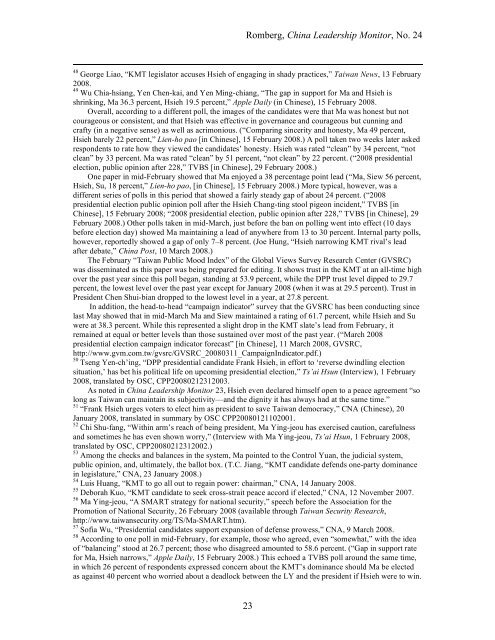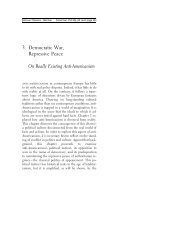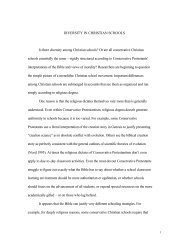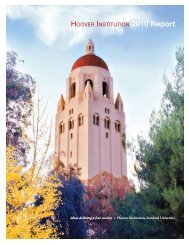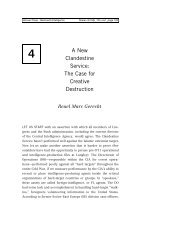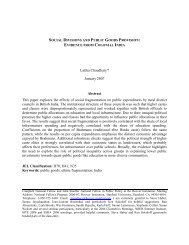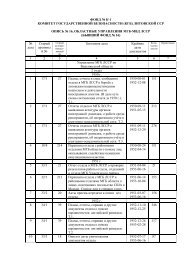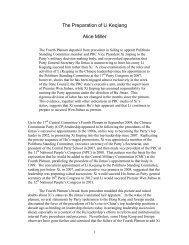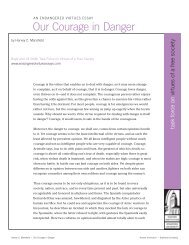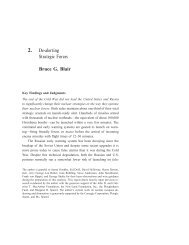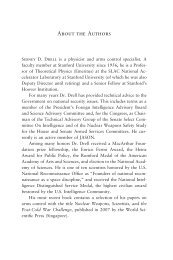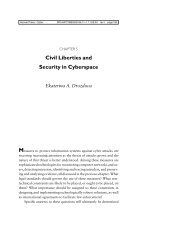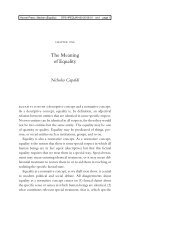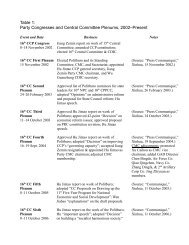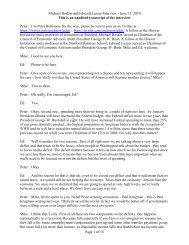Taiwan Elections: Foundation for the Future - Hoover Institution
Taiwan Elections: Foundation for the Future - Hoover Institution
Taiwan Elections: Foundation for the Future - Hoover Institution
Create successful ePaper yourself
Turn your PDF publications into a flip-book with our unique Google optimized e-Paper software.
Romberg, China Leadership Monitor, No. 24<br />
48<br />
George Liao, “KMT legislator accuses Hsieh of engaging in shady practices,” <strong>Taiwan</strong> News, 13 February<br />
2008.<br />
49<br />
Wu Chia-hsiang, Yen Chen-kai, and Yen Ming-chiang, “The gap in support <strong>for</strong> Ma and Hsieh is<br />
shrinking, Ma 36.3 percent, Hsieh 19.5 percent,” Apple Daily (in Chinese), 15 February 2008.<br />
Overall, according to a different poll, <strong>the</strong> images of <strong>the</strong> candidates were that Ma was honest but not<br />
courageous or consistent, and that Hsieh was effective in governance and courageous but cunning and<br />
crafty (in a negative sense) as well as acrimonious. (“Comparing sincerity and honesty, Ma 49 percent,<br />
Hsieh barely 22 percent,” Lien-ho pao [in Chinese], 15 February 2008.) A poll taken two weeks later asked<br />
respondents to rate how <strong>the</strong>y viewed <strong>the</strong> candidates’ honesty. Hsieh was rated “clean” by 34 percent, “not<br />
clean” by 33 percent. Ma was rated “clean” by 51 percent, “not clean” by 22 percent. (“2008 presidential<br />
election, public opinion after 228,” TVBS [in Chinese], 29 February 2008.)<br />
One paper in mid-February showed that Ma enjoyed a 38 percentage point lead (“Ma, Siew 56 percent,<br />
Hsieh, Su, 18 percent,” Lien-ho pao, [in Chinese], 15 February 2008.) More typical, however, was a<br />
different series of polls in this period that showed a fairly steady gap of about 24 percent. (“2008<br />
presidential election public opinion poll after <strong>the</strong> Hsieh Chang-ting stool pigeon incident,” TVBS [in<br />
Chinese], 15 February 2008; “2008 presidential election, public opinion after 228,” TVBS [in Chinese], 29<br />
February 2008.) O<strong>the</strong>r polls taken in mid-March, just be<strong>for</strong>e <strong>the</strong> ban on polling went into effect (10 days<br />
be<strong>for</strong>e election day) showed Ma maintaining a lead of anywhere from 13 to 30 percent. Internal party polls,<br />
however, reportedly showed a gap of only 7–8 percent. (Joe Hung, “Hsieh narrowing KMT rival’s lead<br />
after debate,” China Post, 10 March 2008.)<br />
The February “<strong>Taiwan</strong> Public Mood Index” of <strong>the</strong> Global Views Survey Research Center (GVSRC)<br />
was disseminated as this paper was being prepared <strong>for</strong> editing. It shows trust in <strong>the</strong> KMT at an all-time high<br />
over <strong>the</strong> past year since this poll began, standing at 53.9 percent, while <strong>the</strong> DPP trust level dipped to 29.7<br />
percent, <strong>the</strong> lowest level over <strong>the</strong> past year except <strong>for</strong> January 2008 (when it was at 29.5 percent). Trust in<br />
President Chen Shui-bian dropped to <strong>the</strong> lowest level in a year, at 27.8 percent.<br />
In addition, <strong>the</strong> head-to-head “campaign indicator” survey that <strong>the</strong> GVSRC has been conducting since<br />
last May showed that in mid-March Ma and Siew maintained a rating of 61.7 percent, while Hsieh and Su<br />
were at 38.3 percent. While this represented a slight drop in <strong>the</strong> KMT slate’s lead from February, it<br />
remained at equal or better levels than those sustained over most of <strong>the</strong> past year. (“March 2008<br />
presidential election campaign indicator <strong>for</strong>ecast” [in Chinese], 11 March 2008, GVSRC,<br />
http://www.gvm.com.tw/gvsrc/GVSRC_20080311_CampaignIndicator.pdf.)<br />
50<br />
Tseng Yen-ch’ing, “DPP presidential candidate Frank Hsieh, in ef<strong>for</strong>t to ‘reverse dwindling election<br />
situation,’ has bet his political life on upcoming presidential election,” Ts’ai Hsun (Interview), 1 February<br />
2008, translated by OSC, CPP20080212312003.<br />
As noted in China Leadership Monitor 23, Hsieh even declared himself open to a peace agreement “so<br />
long as <strong>Taiwan</strong> can maintain its subjectivity—and <strong>the</strong> dignity it has always had at <strong>the</strong> same time.”<br />
51<br />
“Frank Hsieh urges voters to elect him as president to save <strong>Taiwan</strong> democracy,” CNA (Chinese), 20<br />
January 2008, translated in summary by OSC CPP20080121102001.<br />
52<br />
Chi Shu-fang, “Within arm’s reach of being president, Ma Ying-jeou has exercised caution, carefulness<br />
and sometimes he has even shown worry,” (Interview with Ma Ying-jeou, Ts’ai Hsun, 1 February 2008,<br />
translated by OSC, CPP20080212312002.)<br />
53<br />
Among <strong>the</strong> checks and balances in <strong>the</strong> system, Ma pointed to <strong>the</strong> Control Yuan, <strong>the</strong> judicial system,<br />
public opinion, and, ultimately, <strong>the</strong> ballot box. (T.C. Jiang, “KMT candidate defends one-party dominance<br />
in legislature,” CNA, 23 January 2008.)<br />
54<br />
Luis Huang, “KMT to go all out to regain power: chairman,” CNA, 14 January 2008.<br />
55<br />
Deborah Kuo, “KMT candidate to seek cross-strait peace accord if elected,” CNA, 12 November 2007.<br />
56<br />
Ma Ying-jeou, “A SMART strategy <strong>for</strong> national security,” speech be<strong>for</strong>e <strong>the</strong> Association <strong>for</strong> <strong>the</strong><br />
Promotion of National Security, 26 February 2008 (available through <strong>Taiwan</strong> Security Research,<br />
http://www.taiwansecurity.org/TS/Ma-SMART.htm).<br />
57<br />
Sofia Wu, “Presidential candidates support expansion of defense prowess,” CNA, 9 March 2008.<br />
58<br />
According to one poll in mid-February, <strong>for</strong> example, those who agreed, even “somewhat,” with <strong>the</strong> idea<br />
of “balancing” stood at 26.7 percent; those who disagreed amounted to 58.6 percent. (“Gap in support rate<br />
<strong>for</strong> Ma, Hsieh narrows,” Apple Daily, 15 February 2008.) This echoed a TVBS poll around <strong>the</strong> same time,<br />
in which 26 percent of respondents expressed concern about <strong>the</strong> KMT’s dominance should Ma be elected<br />
as against 40 percent who worried about a deadlock between <strong>the</strong> LY and <strong>the</strong> president if Hsieh were to win.<br />
23


